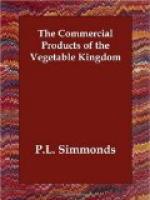The oil obtained from the seeds of Jatropha curcas, a native of South America and Asia, is purgative and emetic, and analagous in its properties to croton oil. It is said to be a valuable external application in itch. In India it is used for lamps.
OIL OF BEN, known as Sohrinja in Bengal, and Muringo in Malabar is obtained from the seeds or nuts of the horseradish tree, Moringa pterygosperma, Burmann; the Hyperanthera Moringa, of Linnaeus. This clear limpid oil having no perceptible smell, is much esteemed by watchmakers and perfumers; it is expensive and not often to be procured pure, consequently the oil would be a very profitable export. It grows rapidly and luxuriantly everywhere in Jamaica, particularly on the north side of the island—as well as Trinidad and other quarters of the West. It is easily propagated either by cuttings from the tree (the branches) or by seeds, and bears the second year. The produce of each tree may be estimated at from one to two gallons. From the flowers a very pleasant perfume might be easily distilled.
The following account I derive from my friend Dr. Hamilton—
“It is a small tree, of about twenty feet in height, of most rapid growth, coming into flower within a few months after it has been sown, and continuing to produce seeds and blossoms afterwards throughout the year. The tree is now naturalised in the West Indies. The timber is said to dye a fine blue, and the gum, which, exudes from wounds in the bark, bears a strong resemblance to that obtained from the Astragalus tragacantha, for which it might, no doubt, be substituted.
The numerous racemes of white blossoms with which the tree is constantly loaded, are succeeded by long triangular pods, somewhat tourlose at the ends, and about two feet in length, when arrived at the full growth. These pods, while yet young and tender, are not unfrequently cooked and served up at the planter’s tables like asparagus, for which they are not a bad substitute. The pods, when full grown, contain about fifteen seeds; each considerably larger than a pea, with a membraneous covering expanding into three wings, whence the specific name of pterygosperma. On removing the winged envelope the seeds appear somewhat like pith balls; but upon dividing them with the nail, they are found to abound in a clear, colorless, tasteless, scentless oil, of which the proportion is so large that it may be expressed from good fresh seeds by the simple pressure of the nail. Geoffry informs us, that he obtained 301/2 ounces of oil from eight pounds of the decorticated seeds, being at the rate of very nearly 24 lbs. of oil from 100 lbs. of seed.
Notwithstanding the great value of its oil, and the facility with which it can be obtained in the West Indies, the moringa has been hitherto valued merely as an ornamental shrub, and cultivated for the sake of its young pods or the horseradish




